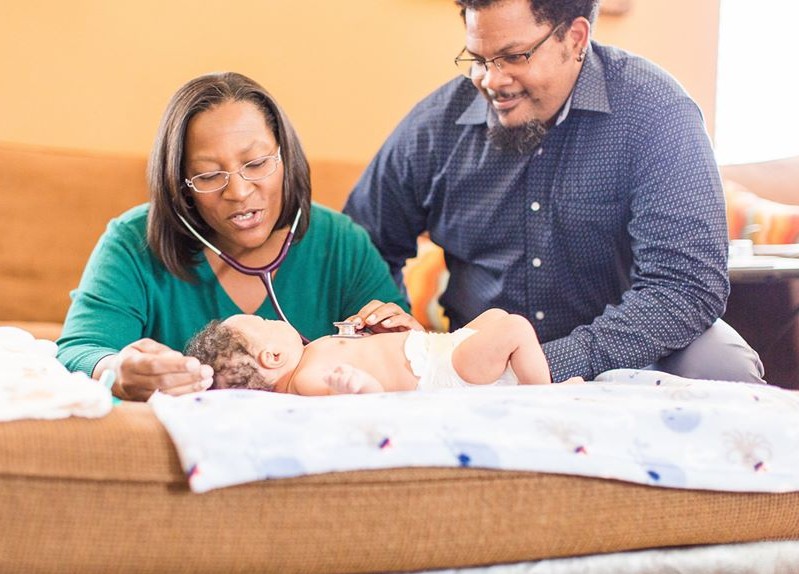Tips for Cold And Flu Season
Well, here we are again. The holidays have come and passed and many kisses and hugs have been shared. Unfortunately, it’s also cold and flu season, which can leave the parents of newborns feeling torn between wanting to share their little bundle of joy with family and friends and protecting them from germs.
The questions I hear most from new parents are:
- Is it okay for the baby to go out?
- What if dad or one of my other children come home sick from daycare or school?
- What if mom gets sick?
The good news is that you don’t have to keep your baby under lock and key. Here are a few simple things you can do to help protect your newborn.
- If you decide to take your newborn out, avoid places with large crowds. Also, consider wearing your baby as it provides limited contact with the environment. There’s a wide range of opinions about taking newborns out in the first few weeks of life. I recommend doing what works best for you and your family. The truth is, some parents don’t have the option of staying indoors and others get cabin fever and need to get out of the house. Whatever the reason, always utilize good handwashing with warm soap and water or use hand sanitizer if you are out and don’t have access to soap and water.
- Anyone with any signs of illness, including cold sores should wait to visit.
- Have all visitors wash their hands before holding or playing with the baby.
- Snuggles are okay but kissing baby is a “no-no”, even for those who are not sick. Sometimes people are contagious even before the first signs of cold or flu appear.
- Consider having those in the family who can get the flu shot get one. Because the baby can’t get a flu vaccine until 6 months, they depend on others being immunized to protect them.
- Whooping cough is something many people overlook. Whooping cough can be deadly for newborns. The vaccine for pertussis is generally given in conjunction with a tetanus vaccine. It’s okay to ask if extended family members like aunties, uncles, and grandparents are up to date on this vaccine. They are typically easily obtained at your local pharmacy or doctor’s office.
If someone living in the home gets sick, there are still some things you can do to protect the baby.
- If a family member living in the home has a fever, a temperature of 100.4 or higher, they should stay away from the baby, preferably in a separate room.
- If someone in the home has cold symptoms and they are needed to help care for baby, they should make sure to practice good hand hygiene and well and wear a face mask.
- Teach older children in the home to cover coughs and sneezes in the crook of their elbow or a tissue and have them clean their hands well after blowing their noses. This can be harder with toddlers so try to steer them clear of mom and the new baby as much as possible.
- If mom is sick, even with a fever, she should continue to breastfeed so that the baby gets protective antibodies from mom’s milk.
If your newborn is showing signs of illness, consult with your pediatrician right away. Especially if your baby has any of the following:
- Irritability
- Poor feeding
- Low temperature: <97 (Rectally)
- High temperature: 100.4 or higher (rectally)
- Difficulty waking – lethargy
Because a newborn’s immune system is immature, they’re not well equipped to manage bacterial or viral infections. So, if your baby has an abnormally low or an elevated temperature they must to be evaluated right away. If your baby is less than 6 weeks old, you can expect your pediatrician to recommend that you go directly to your local emergency department.
- If possible, be sure to utilize a hospital with a designated pediatric emergency room.
- Avoid urgent care centers, even those designed to treat kids. If you have a newborn with a fever, they will transfer you to the hospital anyway.
- If your baby is less than 30 days old, expect that your little one will spend at least 36-48 hours in the hospital.
Of course, as a new parent, you will always worry about the health and safety of your newborn. Know that you can spend quality time with family and friends this winter by taking some simple steps to ensure that your newborn remains happy and healthy.
Disclaimer: These are tips for surviving the flu and facts about what you can expect from Dr. Janet West, MD, MBA. Pediatrician & Founder of RVA Baby.
—
The Latched Mama blog does not provide medical advice, diagnosis or treatment.
Content from the Latched Mama blog is not intended to be used for medical diagnosis or treatment. The information provided on this blog is intended for general consumer understanding and entertainment only; with experiences shared from Mom to Mom. The information provided is not intended to be a substitute for professional medical advice. ***Please contact your family pediatrician to discuss professional medical advice.***

I’m very pleased to see that vaccinations are recommended here! In this age of people losing their minds over vaccines and all the misinformation and nonsense being regurgitated by anti-vaxxers, it’s refreshing to see facts being presented about how being UTD on our vaccines can save babies (and everyone’s!) lives!